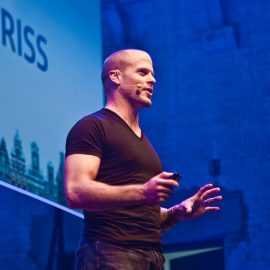

This article is an excerpt from the Shortform book guide to "Secrets of the Millionaire Mind" by T. Harv Eker. Shortform has the world's best summaries and analyses of books you should be reading.
Like this article? Sign up for a free trial here .
What is Secrets of the Millionaire Mind about? What do rich people do differently, according to its author T. Harv Eker?
In his book Secrets of the Millionaire Mind, T. Harv Eker reveals the difference between rich people and poor people. This difference lies in how they’ve been conditioned to think and feel about money. Eker argues that these attitudes impel you to take actions that either move you toward financial success or away from it—if you aren’t happy with your finances, it’s because your unproductive beliefs about money hold you back from the financial success that you want.
Below is a brief overview of his key ideas.
Your Money Mindset Defines Your Level of Wealth
In his book Secrets of the Millionaire Mind, T. Harv Eker argues that you can dramatically improve your finances by taking conscious control of your thoughts and adopting a rich attitude—this rich attitude will inspire you to take new actions that lead to your financial success.
According to Eker, your money mindset is a construct of all of the beliefs you hold about money. This construct programs the way you relate to money because:
- Your thoughts and beliefs determine how you feel.
- Your feelings determine the decisions you make and how you act.
- Your actions determine the results you get and how much money you have.
Therefore, this programming leads you to develop habits and behave (often unconsciously) in specific ways to create results that align with your money mindset.
| Your Thoughts About Money Impact Every Area of Your Life While Eker narrows down the impact of your thoughts and beliefs on your behavior to focus solely on money, psychologists and self-help practitioners argue that your beliefs impact all areas of your life, even if they seem to relate to just one. This is because how you think, feel, and behave in one area of your life influences the decisions you make in all areas of your life. For example, you feel insecure about your love life. Each time you get into a relationship, you give up a lot of your time and energy in an attempt to make the relationship work. Your insecurity about your relationship leads you to neglect your friends and your personal goals, such as maintaining a fitness routine or working on side projects to meet your financial goals. The example illustrates the difficulty with singling out thoughts and beliefs for specific areas of your life—in this case, your beliefs about your love life impact your finances, your fitness, and your friendships. Therefore, throughout the rest of this guide, reflect on how your thoughts and beliefs in all areas of your life impact your finances and vice versa—how your thoughts and beliefs about money impact your overall life experience. |
Your Money Mindset Is a Result of Childhood Conditioning
Eker claims that your current money mindset is a result of childhood conditioning. As a child, you unconsciously absorbed thoughts, emotions, and beliefs about money from your role models and your environment. Everything you heard, saw, and experienced about money influenced your beliefs about how to manage your finances, and conditioned you to behave in specific ways. These thoughts and opinions now make up your mindset and determine what you believe about money. These beliefs then unconsciously dictate how you think, feel, and behave when you manage your finances.
For example, if your role models worked hard but never had enough money to enjoy themselves, you may have the belief: “There is never enough money, no matter how hard I work.” This belief creates an uncomfortable feeling every time you think about going to work or managing your finances, and it leads you to act in unproductive ways such as frivolously spending your money instead of saving it. Your discomfort may also cause you to resent people who do have enough money. In contrast, if you grew up in an environment where money was not a cause for concern because there was always enough, you’re less likely to feel discomfort or resentment around the subject of work and money.
| Your Conditioning Is a Result of What You Believe to Be True The author of Psycho-Cybernetics, Maxwell Maltz, validates Eker’s argument that you picked up beliefs throughout your childhood that conditioned you to behave in certain ways. He argues that you unconsciously adopted the opinions and beliefs of others as truths, regardless of whether or not these opinions were based on facts. Why did your mind accept what you heard, saw, and experienced as truth? It’s because your nervous system can’t tell the difference between imagination and reality—it can only respond to what you think or imagine to be true. When you were young, you were less able to question what was going on around you and to form your own rational conclusions. As a result, you simply absorbed everything you experienced and your mind accepted these experiences as truths. As an adult, you can decide what you choose to believe but, according to Maltz, the “truths” you accepted as a child continue to live in your mind and inform your feelings and behaviors. He suggests that you take control of these outdated truths and replace them with what you choose to believe by regularly visualizing yourself acting in ways that align with what you want. Maltz claims that, with constant practice, your mind will gradually become accustomed to accepting your new thoughts and beliefs as truth and will let go of the old, unproductive beliefs. |
Your Childhood Influences: Are You Conforming or Rebelling?
Eker argues that while your money mindset is a result of childhood conditioning, it doesn’t always mean that you’ll replicate your role models when it comes to managing your money. You may end up producing entirely different results depending on how you originally chose to interpret what was going on and whether you chose to conform or rebel against your upbringing. In either case, your interpretation of your upbringing defined the beliefs in your money mindset.
- For example, if your parents spent a lot of money on friends and family, you may have positively interpreted money as a way to be generous to others (leading to conformity with your upbringing), or you may have negatively interpreted it as a way for others to take advantage of your parents (leading to rebellion against your upbringing.)
(Shortform note: Eker claims that your interpretation of your experiences defines your beliefs. Similarly, Maltz (Psycho-Cybernetics) argues that the way that you identify with your experiences determines the beliefs you form. For example, if your guardians couldn’t afford to buy you something you wanted, you could’ve identified with this experience in multiple ways—you could’ve appreciated your parents for doing the best that they could, or you could’ve responded with feelings of anger and disappointment. Whatever emotion you chose created corresponding beliefs in your mind.)
Your Financial Setpoint
Eker claims that the beliefs in your money mindset also include a conclusion about the amount of money you trust yourself to manage effectively. This amount defines your capacity for wealth—we’ll refer to this as your “financial setpoint.”
Your money mindset creates specific results that align with your financial setpoint: It programs you to think and behave in specific ways to create results that conform to your unconscious beliefs about how much money you can manage. Even if you manage to earn money past this amount, you won’t be able to hold onto it for long. This is because your money mindset operates from the belief that you can’t handle the challenges that come with managing more money; so it drives you to act in ways that squander that money. In other words, your money mindset ensures that your finances always reflect your financial setpoint.
| Why Would You Limit Your Financial Setpoint? Throughout the book, Eker very briefly touches on concepts such as the law of attraction and the role your subconscious plays in guiding your thoughts and actions to match your financial setpoint. But he doesn’t explain exactly why you would limit yourself by setting a low financial setpoint. Therefore, we’ll refer to research based on the psychology of success to provide some insight into why your financial setpoint is where it is. According to Maltz (Psycho-Cybernetics), you developed limiting beliefs as a way to protect yourself from emotionally uncomfortable (unsafe) situations—the way you identified with the uncomfortable situation led you to feel unwanted negative emotions. You reacted by forming a conclusion about what led to this discomfort and you made the decision to avoid similar situations and protect yourself from future discomfort. Your mind stored this decision as a belief. Even though you’re not conscious of this belief, it continues to impact your thoughts, feelings, and behaviors. For example, your parents worked hard for their money and didn’t have a lot of time for you. Every time they achieved a level of comfort around their finances, friends and family members would ask for handouts. Your parents always gave their money to those who asked. They continued to work hard and rarely spent any money on themselves or made time to enjoy themselves. You observed all of this and felt uncomfortable. You resented your parents for working so hard and having so little time for you. You resented them for prioritizing the needs of others. You also resented all of the people that took advantage of your parents. These feelings of resentment led you to associate having money with being taken advantage of, and you decided that you would never let yourself get treated that way. This turned into a belief and created your financial setpoint: If you have over $X you’ll get taken advantage of, so it’s safer to never have more than that amount. |
The Poor Mindset
Eker argues that thoughts and beliefs about money tend to fall into either a rich mindset (an attitude that moves you toward financial success) or a poor mindset (an attitude that moves you away from financial success). If you’re not happy with the state of your finances, it’s because you’ve been negatively conditioned to have a poor money mindset: Your unproductive thoughts and beliefs impel you to act in ways that move you away from financial success.
| Wealth Doesn’t Always Equate to Success Eker claims that your thoughts and beliefs about money fall into two categories: rich and poor. It’s also clear that he considers wealth to be the root of well-being and success—if you’re rich, you’re happy and successful. On the other hand, if you’re poor, you’re unhappy and unsuccessful. While self-improvement literature does support the concept of classifying our thoughts into distinct groups that determine our likelihood of success, it tends to provide a more well-rounded definition of well-being and success than Eker provides. For example, Carol S. Dweck (Mindset) argues that your traits and tendencies determine whether you have a “growth mindset” that leads you to success, or a “fixed mindset” that inhibits your success. Dweck’s focus is not on what you have or achieve, but on your general attitude and approach to all areas of your life. According to her, you’re successful if you have a growth mindset, consistently embrace challenges, and take steps to move forward and improve your life. Therefore, even if you have very little money, you’re more successful than someone who may have more money but, due to their fixed mindset, fails to move past self-imposed limitations due to a lack of confidence or motivation. |
Poor People Have a Negative Attitude and Mismanage Their Money
Eker argues that, if you have a poor mindset, each time you engage in negative thought patterns, you reinforce the belief that you’re powerless when it comes to money. This is because you deny your role in your financial situation and reinforce the negative conditioning you adopted throughout your childhood—the more you engage in this type of thinking, the more you associate money with the feeling of powerlessness. As a result, you’re incapable of achieving the financial success that you want.
(Shortform note: The Happiness Advantage sheds light on Eker’s claim that negative thoughts lead you to feel powerless. The book presents the latest research in neuroscience and positive psychology to argue that happiness is the cause of success: When you cultivate the habit of thinking positive thoughts, you train your brain to find opportunities in adversity and more easily overcome challenges and setbacks. On the other hand, when you habitually think negative thoughts, your pessimism blocks you from perceiving opportunities and trains your brain to shy away from challenges. This stops you from moving forward and leaves you feeling powerless to improve your situation.)
How Negative Conditioning Manifests
Eker claims that this negative conditioning is easy to identify once you start taking notice of how you think and talk about money. But, he argues, instead of investigating why they’re unable to overcome their financial problems, poor people deflect attention away from themselves and seek external causes for their problems. They blame others for their misfortune, resent people who have what they want, and justify their poverty and their negative attitudes with false beliefs such as, “Rich people are greedy and corrupt.”
Eker claims that poor people use these tactics to relieve the stress of feeling poor and powerless. Unfortunately, these stress-relievers leave them locked into operating from a negative mindset that keeps them in poverty.
(Shortform note: The negative mindset that Eker describes is more commonly referred to as a victim mentality—the belief that bad things always happen to you through no fault of your own. This belief creates a feeling of apathy because, when you feel like other people are always trying to thwart you, you find it difficult to build the motivation to take positive action and change your life. Instead, people with a victim mentality often magnify their problems and their perceived injustices in an attempt to seek attention (comfort, sympathy, reinforcement of their beliefs) from others. The attention they receive from others validates their powerlessness and keeps them from moving forward.)
The Rich Mindset
Eker believes that you can consciously reprogram your money mindset to improve your finances by replacing your unproductive thoughts and beliefs about money with the productive thoughts and beliefs that rich people have. The more you think like a rich person, the more you’ll improve your money mindset and raise your financial setpoint so that you can comfortably accumulate and manage more money.
(Shortform note: According to Eker, you only need to replace your unproductive thoughts and beliefs about money with productive thoughts and beliefs to increase your financial setpoint. Similarly, lots of self-help books claim that you just need to improve your thoughts to improve your life. For example, Louise Hay (You Can Heal Your Life) argues that you just need to “affirm” what you want to make it come true: Change the statement “I’m not rich” to “I am rich” and repeat this multiple times a day. Eventually, you’ll come to believe this thought and your programming will align with your new beliefs. As a result, you’ll find yourself naturally taking actions that lead to more money.)
Rich People Have a Positive Attitude and Effectively Manage Their Money
Eker argues that rich people always have a positive attitude towards their finances. They hold themselves accountable for the state of their finances and they take full responsibility for the impact of their thoughts and decisions. They understand that their positive thoughts lead them to take actions that produce successful results.
(Shortform note: While many people characterize a positive attitude according to multiple factors, such as how well you treat other people or how ethical you are, Eker focuses solely on the productive thoughts required to build and maintain wealth—not general personality traits or ethical behavior. This arguably makes his definition a little limited.)
Throughout the rest of this part, we’ll outline the specific thought patterns and habits that Eker claims rich people practice.
Rich Mindset 1: Develop Discipline and Take Responsibility for Your Finances
Eker claims that rich people know that positive thoughts lead to positive actions. These positive actions lead to success and wealth. Consequently, they always focus on finding and creating solutions so that they can meet their financial goals.
(Shortform note: Like Eker, Tony Robbins (Awaken the Giant Within) argues that you must consciously decide to make your current thought patterns and behaviors more positive to change your life. He claims that each of your decisions (about how you think and behave) set into motion a series of actions that ultimately shape your life—each time you reflect on how your decisions have led you to create positive and negative experiences, you can learn from them and choose to make more beneficial decisions.)
Rich Mindset 2: Appreciate What You Want and Associate With Wealthy People
According to Eker, rich people feel inspired by the success of others—they avoid associating with negative people and they take every opportunity to learn and take advice from people who are more successful than they are.
(Shortform note: Law of Attraction practitioners agree with Eker’s suggestion that you should avoid identifying with what you don’t want and instead look for ways to habituate yourself with what you do want. Therefore, it’s worth considering how you can surround yourself with and learn from people that inspire you. A practical way to approach this is to first consider whether the activities you engage in, or the people you hang around with, support or hinder your financial goals. Next, make a list of the wealthy and successful people you already know, and try to learn more about how they accomplished their goals.)
Rich Mindset 3: Stop Making Excuses and Confront Your Fears
Eker argues that rich people take measurable steps towards what they want. They always focus on the end result of what they want to achieve, and they expect to succeed despite their doubts and fears. They plan ahead and create strategies to overcome their fears or potential problems—their confidence grows with each step they take to move forward.
(Shortform note: Like Eker, Tim Ferriss suggests that you plan ahead and create strategies to overcome your fears. He argues that you’re more likely to hold back from taking action when you think of your fears as just vague possibilities that could happen. On the other hand, when you think about what you want to achieve and define the actual worst-case scenario, you give your mind something specific and productive to work on. As a result, you’ll feel more prepared to move toward your financial goals and tackle setbacks along the way.)
Rich Mindset 4: Aim High
According to Eker, rich people set a clear intention to create massive wealth—they align their thoughts and behaviors with this intention and their commitment leads them to take actions that create wealth. This clarity of intention allows them to focus wholeheartedly on what they want and they willingly make any necessary sacrifices to achieve their goal. Their motivation to create wealth overrides their doubts and fears and makes them more resilient to setbacks.
(Shortform note: Research supports Eker’s claim that setting ambitious intentions increases your likelihood of achieving your financial goals. This is because intentions force you to focus on who you want to be, and they increase your self-discipline when you’re faced with conflicting choices about how to spend your time or your money. For example, if you set a clear intention to invest a specific amount of money into a savings account, you’ll know the right way to act when faced with a decision between saving and wasting your money on something frivolous.)
Rich Mindset 5: Promote Your Value
Eker claims that rich people understand that salaries or hourly wages limit their income (your income is tied directly to the number of hours you work). Therefore, they aim to get paid for the value they provide and the results they produce. They do this by opting for commission, profit sharing, or investing in their company’s stock options.
(Shortform note: How can commissions or profit-sharing pay more than a salary? When you work for an employer, you only get paid a fraction of the value that you generate—this value may be many multiples of your hourly wage or salary. For example, you earn $20 an hour and work 40 hours a week—your salary is $800 a week. But the work you do generates sales for your employer totaling $5,000 a week. If you were paid a 25% commission, you would receive $1,250 a week ($450 more each week). Unlike a standard salary, the more sales you generate, the more income you receive so it’s in your best interest to produce results and promote your value.)
Because their income is tied directly to the results they produce, rich people make every effort to promote themselves and the value that they have to offer—being overlooked or ignored means they don’t receive an income. Therefore, they make sure that they reach and benefit as many people as possible to maximize their profits: The more people they reach, the more income they receive.
(Shortform note: Eker’s claim that self-promotion is necessary to acquire wealth implies that extroverted people are more likely to feel comfortable with this process than introverted people. If the thought of indulging in verbal self-promotion makes your palms sweat, don’t feel pressured to adopt a more confident persona just to get ahead. Instead, consider how you can communicate your professional skills and value to just one or two people at a time. With practice, you’ll not only develop the confidence to talk about your expertise and accomplishments to bigger groups, but you’ll also receive the recognition you deserve.)
Rich Mindset 6: Think Long-Term, Leverage Your Money, and Build Your Net Worth
Eker argues that rich people plan for their long-term wealth by growing all of their financial assets (their net worth): They think of the money they earn as seeds that they can plant in order to grow more money for their future wealth. The more money they grow, the less they have to work to pay for their lifestyle. Rich people work to receive an income but they also leverage their money in a way that makes it grow for them in the long term.
(Shortform note: Like Eker, David Bach (The Automatic Millionaire) argues that you should develop the skills to leverage your money and increase your net worth regardless of what you earn. This way, you’ll develop positive habits that will increase your current net worth and prepare you to effectively manage your future income. Bach also suggests that you plan for your retirement by setting up a tax-deferred retirement account and maximizing your contributions. He argues that it’s the safest and most proactive way to grow your money and ensure that you’re financially comfortable after you stop working.)

———End of Preview———
Like what you just read? Read the rest of the world's best book summary and analysis of T. Harv Eker's "Secrets of the Millionaire Mind" at Shortform .
Here's what you'll find in our full Secrets of the Millionaire Mind summary :
- The difference between the way rich people and poor people think and feel about money
- How to improve your finances by taking conscious control of your thoughts
- Why you may be holding yourself back from becoming wealthy






